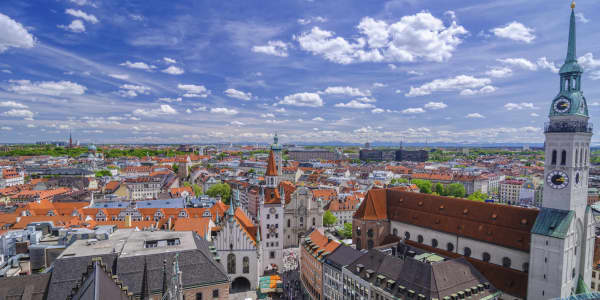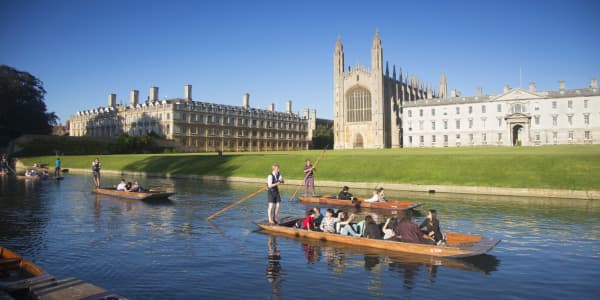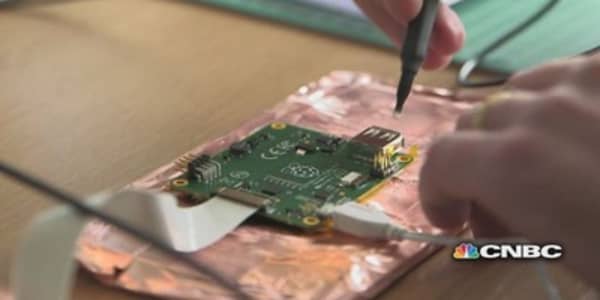The University of Cambridge is synonymous with excellence. A world class educational institution, it is a place where some of the world's sharpest minds go to study, research and innovate.
Cambridge alumni include scientific titans whose discoveries have changed the way we live, to literary geniuses who have enriched our lives.
Here, CNBC.com takes a look at some of the famous faces who have deep ties with both the city and its university.
By Anmar Frangoul, special to CNBC.com
Sir Isaac Newton, Trinity College, Cambridge:
The son of a farmer, Isaac Newton was born in 1643. One of the most brilliant scientists ever, Newton began his studies at Cambridge in 1661, and was made a fellow of Trinity College in 1667.
His three laws of motion and law of universal gravitation – which described gravity as a universal force that affected all objects, including planets – were revelatory, whilst his research on optics and calculus were both innovative and influential.
Thomas Malthus, Jesus College, Cambridge:
In 1798's An Essay on the Principle of Population, Malthus proposed the theory that the growth of a population would outstrip food supply.
Malthus' theory was controversial, but influenced others, including Charles Darwin, who went on to develop his theory of natural selection.
Charles Darwin, Christ's College, Cambridge:
The father of evolutionary biology, Charles Darwin's theory based on natural selection came to prominence with the publication of his book, 'On the Origin of Species', in 1859.
Darwin proposed that all species had evolved from very simple forms of life over billions of years. His contention that humans were essentially animals put him at odds with the Church and its views surrounding creation, a debate that still rages to this very day.
Francis Crick, Gonville and Caius College, Cambridge:
In late February 1953, Francis Crick walked into The Eagle, a pub in the center of Cambridge, and stunned drinkers with an announcement: "We have found the secret of life."
Together with James Watson, and with help from Rosalind Franklin, Crick had discovered the structure of DNA, one of the 20th century's greatest scientific breakthroughs, which won them the Nobel Prize in 1962.
Sylvia Plath, Newnham College, Cambridge:
One of the greatest poets of the 20th century, Massachusetts born Plath read English at Newnham College, Cambridge.
Her visceral poetry helped popularize 'confessionalism' as a literary style, and her marriage to Ted Hughes (pictured here with Plath in Paris) was a compelling, tempestuous and ultimately doomed relationship.
In the winter of 1963, Plath committed suicide. She was posthumously awarded a Pullitzer Prize in 1982.
Stephen Hawking, Trinity Hall, Cambridge:
After gaining a first class honours degree at the University of Oxford, Stephen Hawking studied for a PhD in cosmology at Cambridge, and completed it despite a diagnosis of amyotrophic lateral sclerosis – or ALS – at the age of 21.
Lucasian Professor of Mathematics at Cambridge from 1979 until 2009, Hawking is regarded as one of the world's most famous theoretical physicists and cosmologists. His bestselling book, A Brief History of Time, confirmed him as one of our great communicators of science.
Sir Antony Gormley, Trinity College, Cambridge
One of the UK's foremost sculptors, Gormley studied art history, archaeology and anthropology at Trinity College.
Gormley won the prestigious Turner Prize in 1994. In 1998 his vast, iconic installation, the Angel of The North, was completed. A 20 meter high sculpture of an angel, it is seen by 33 million people every year, according to Gateshead Council.
Michael Foale, Queens' College, Cambridge
In 1995 Foale became the first British born astronaut to take part in a spacewalk while aboard NASA's space shuttle Discovery.
According to NASA, the purpose of Foale's spacewalk was to evaluate, "extremely cold spacesuit conditions… [and explore] mass handling of the 2800-pound Spartan satellite."
Foale – who gained a PhD in astrophysics at Cambridge – went into space six times in total, and took part in four space walks.




